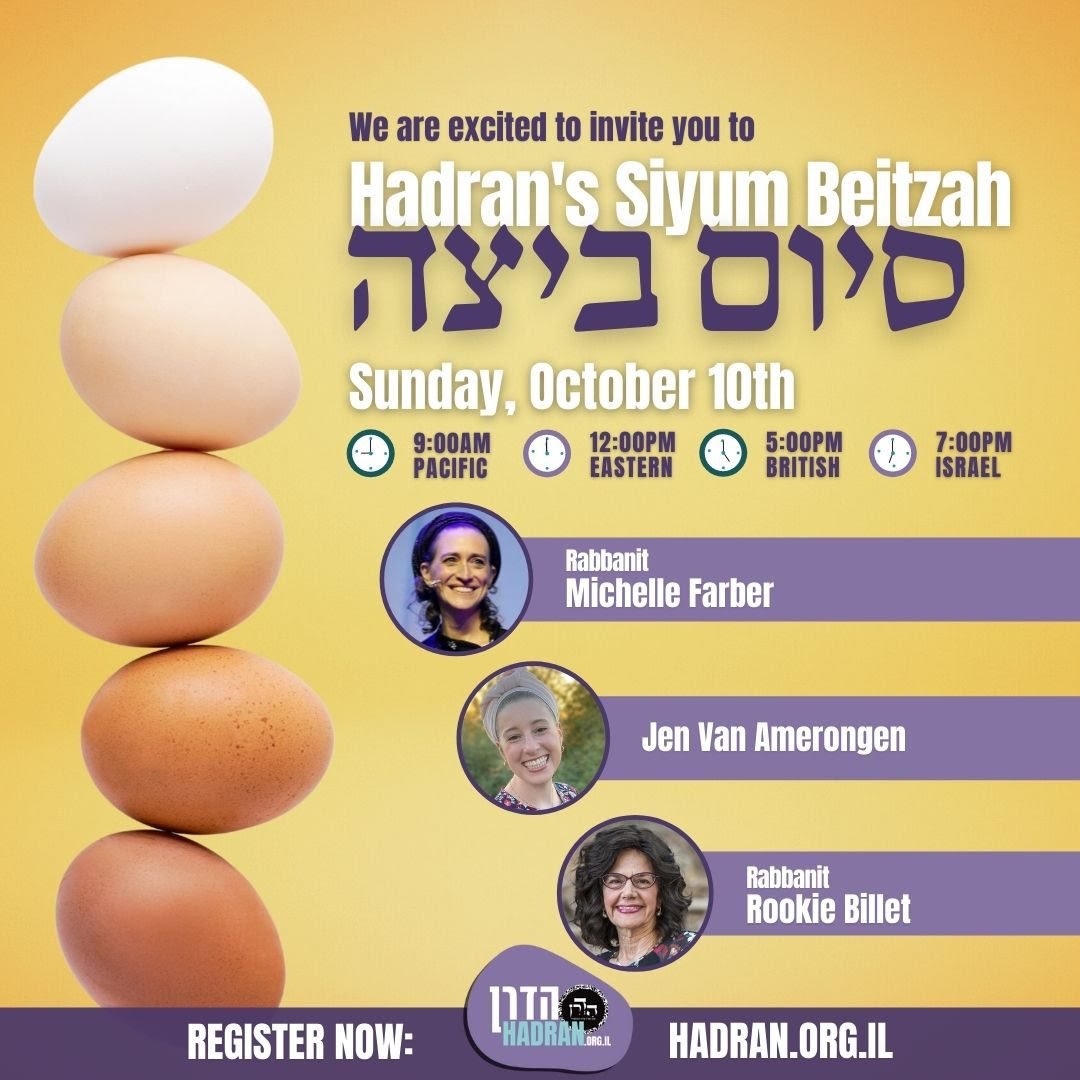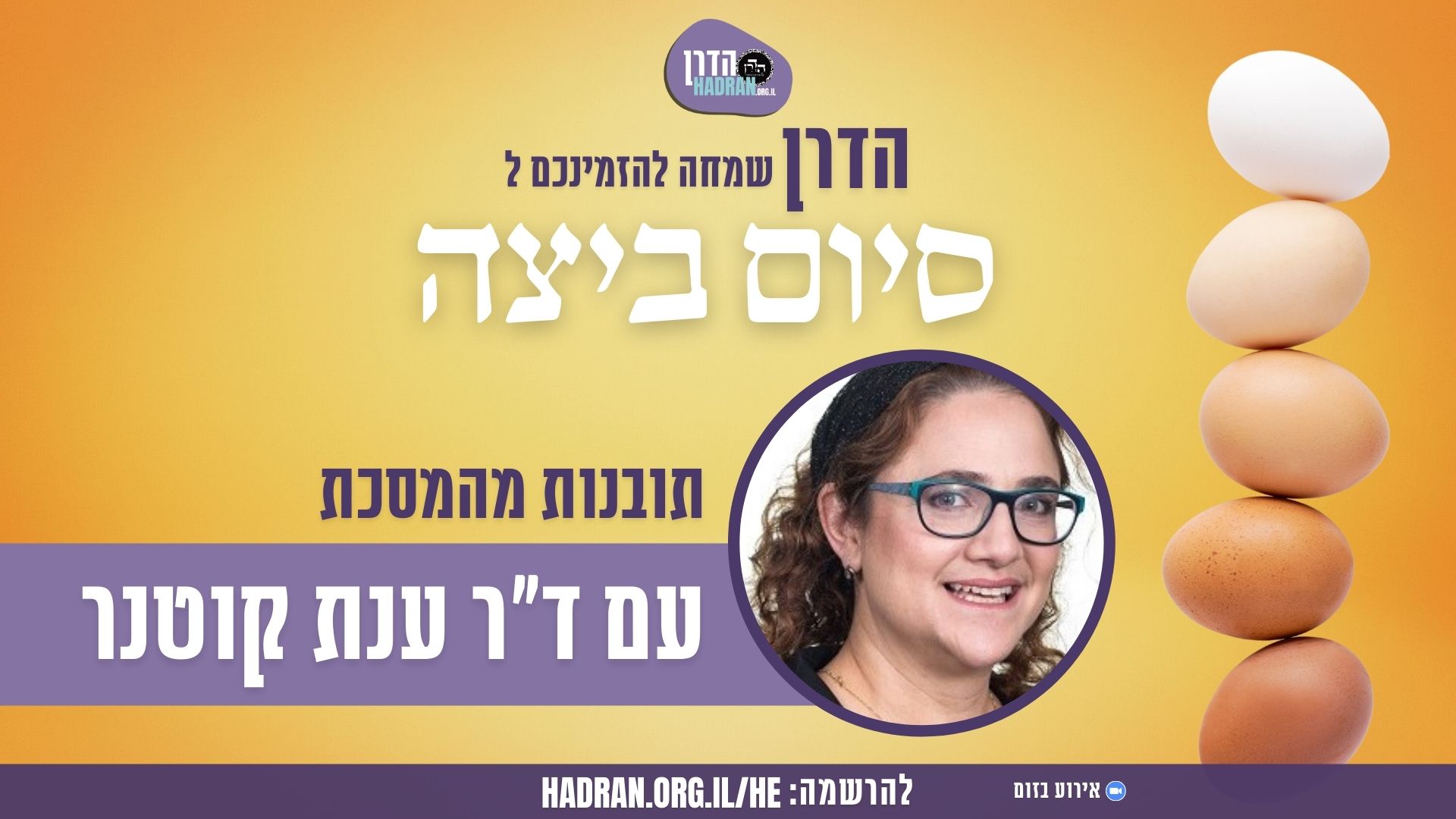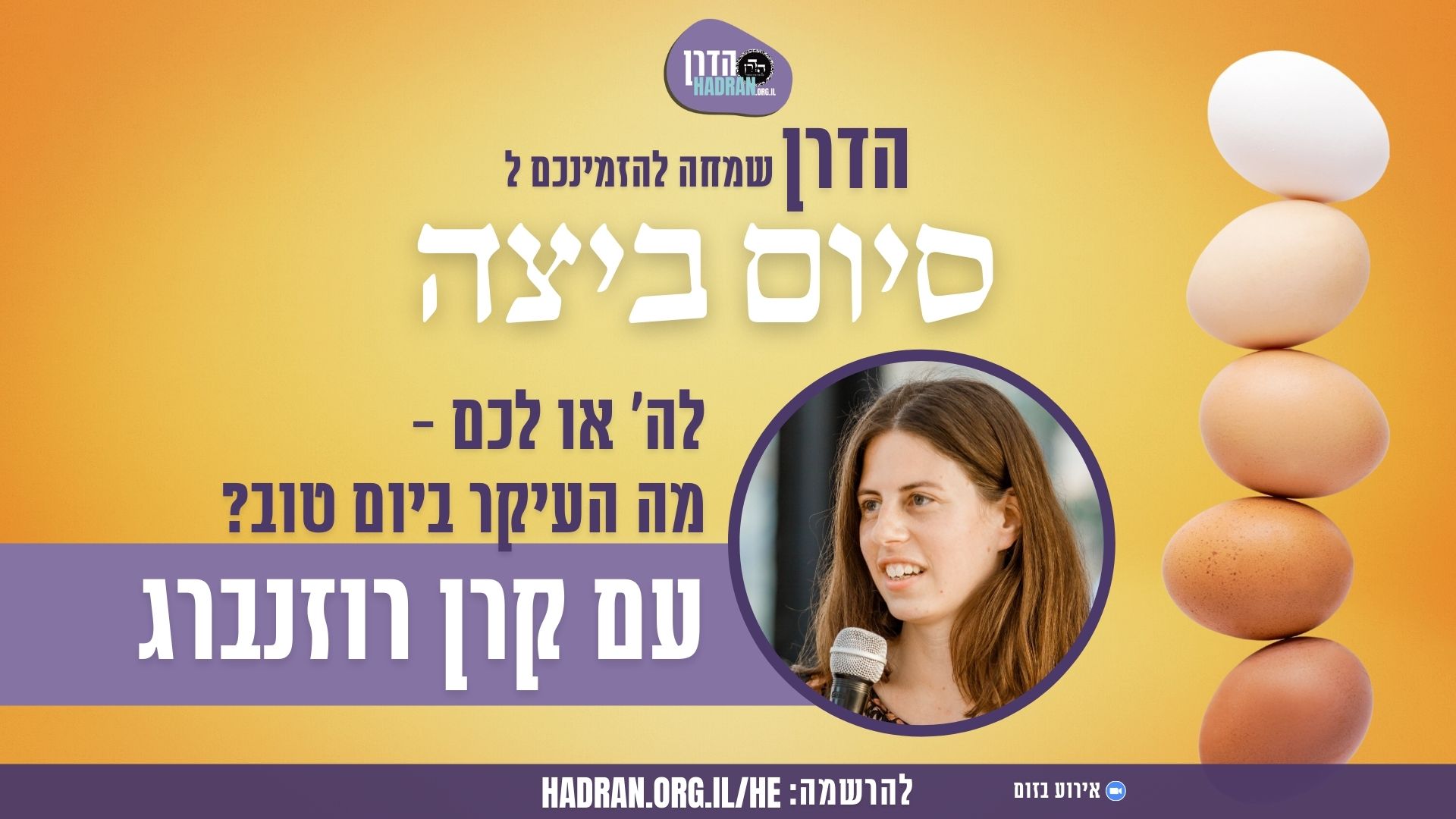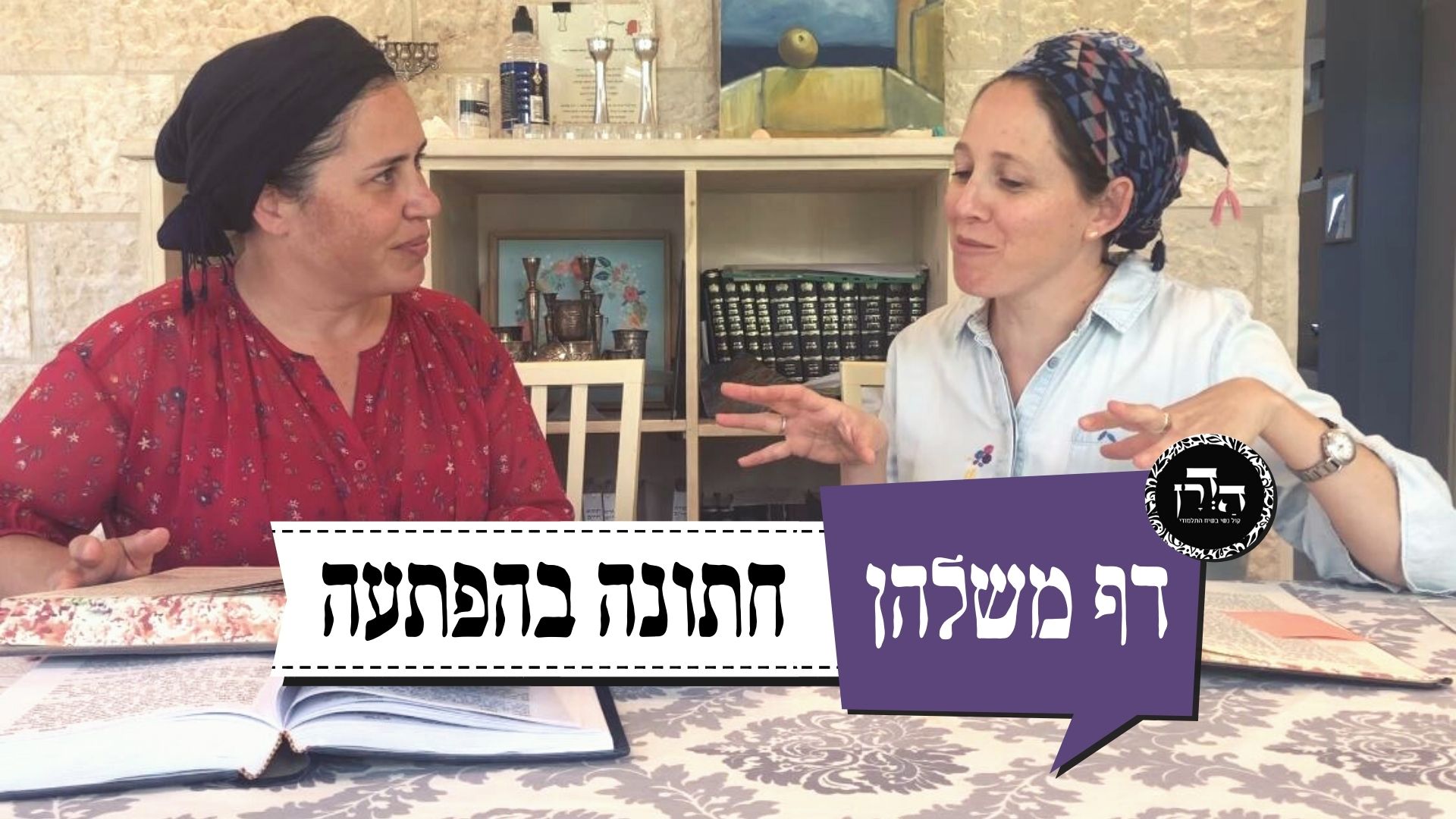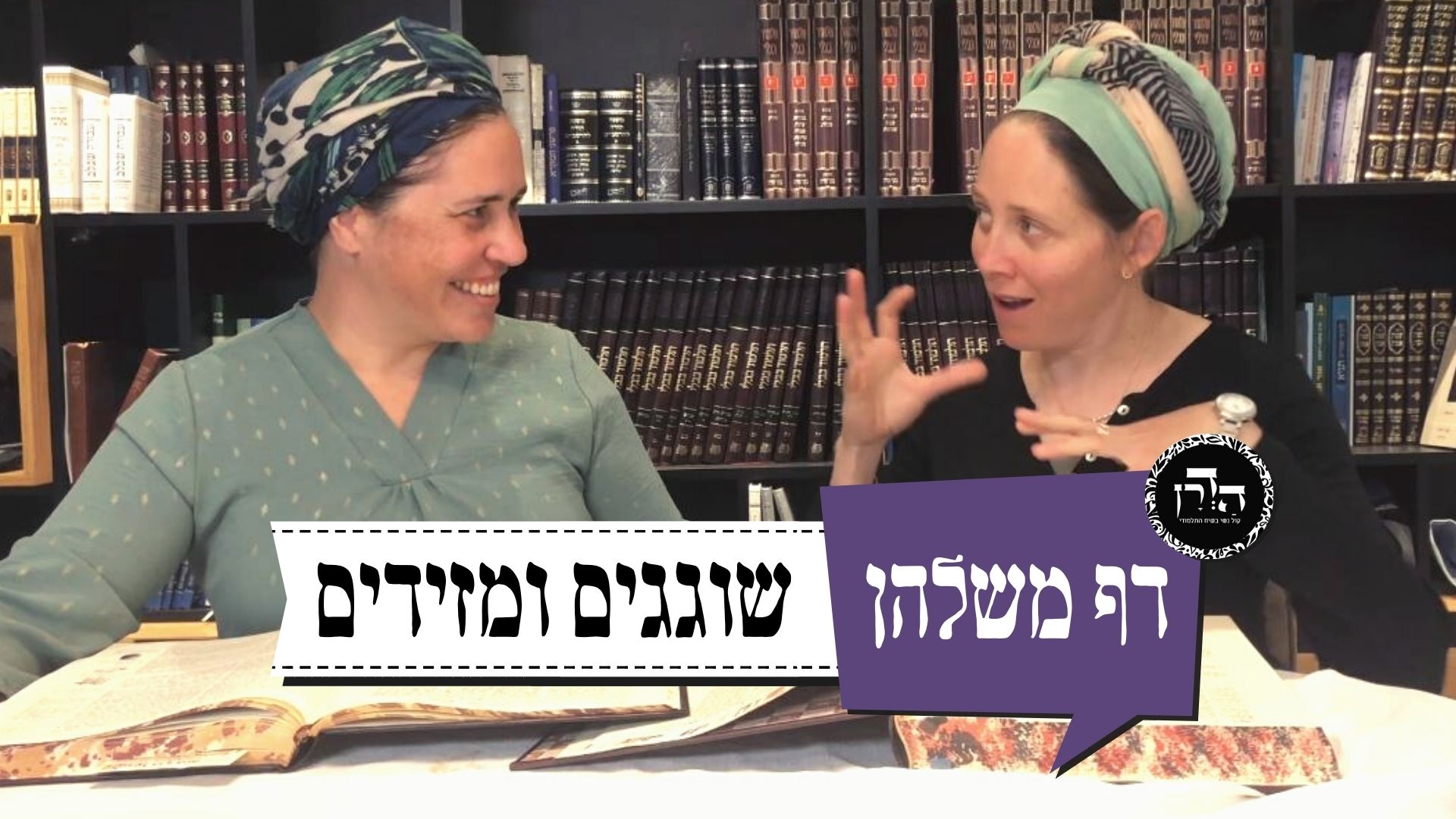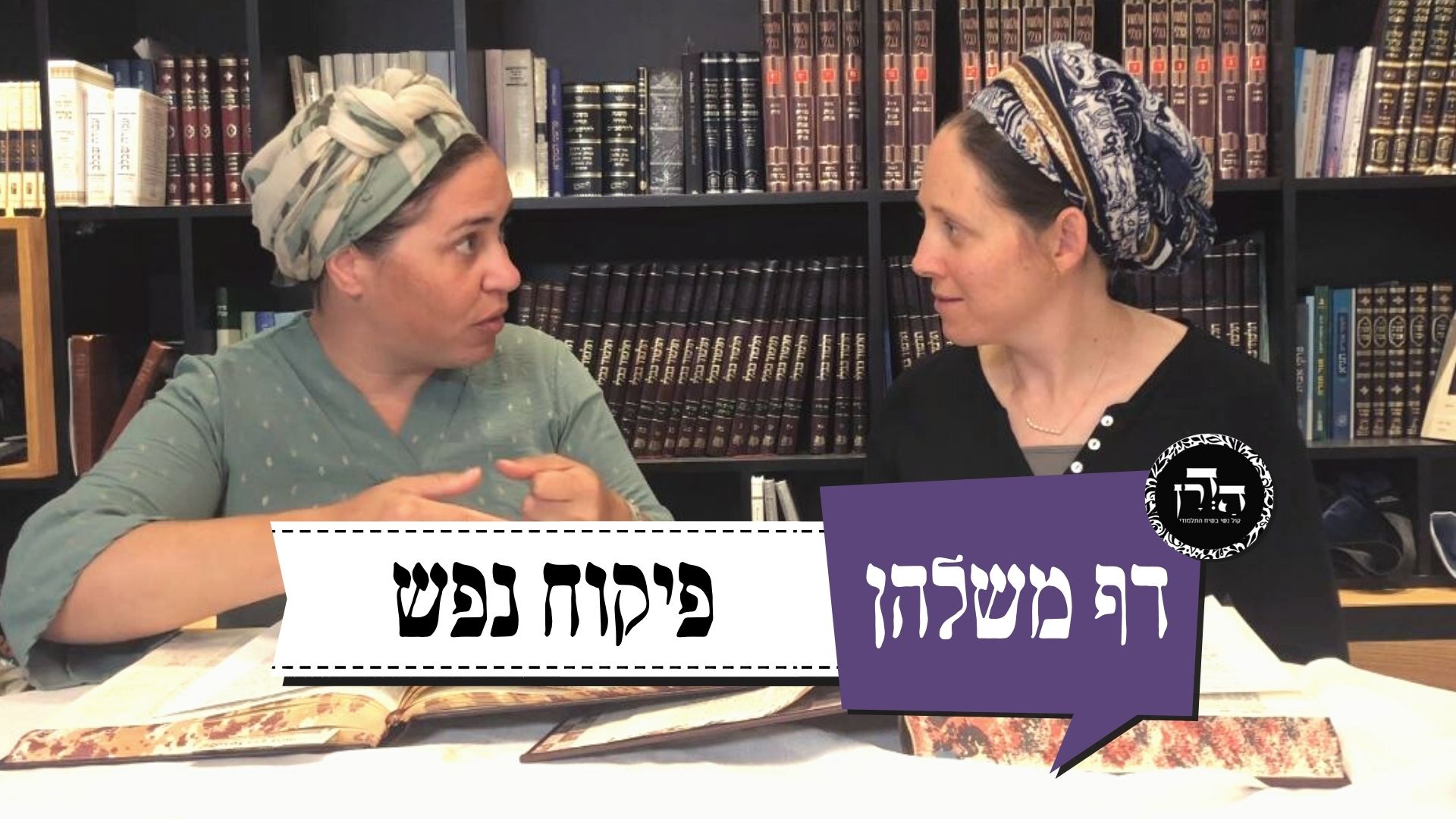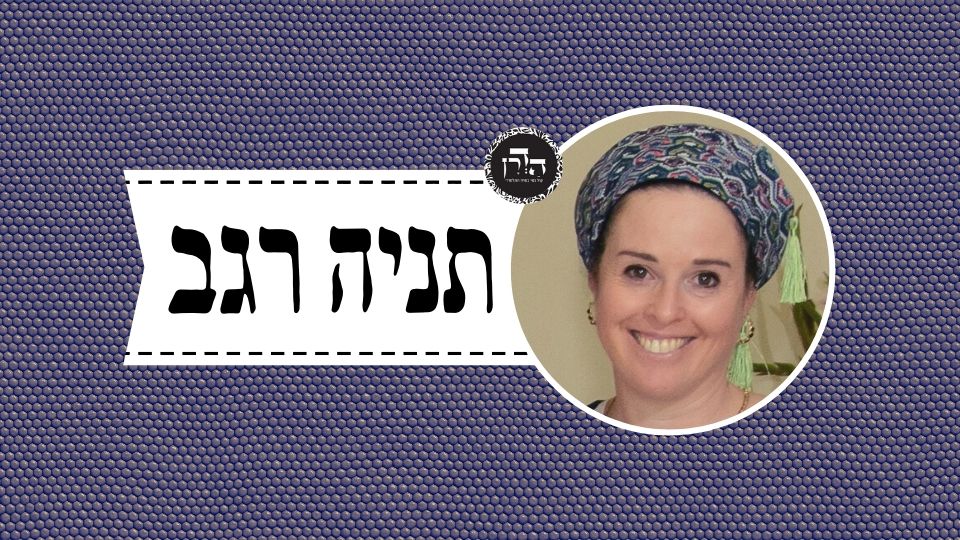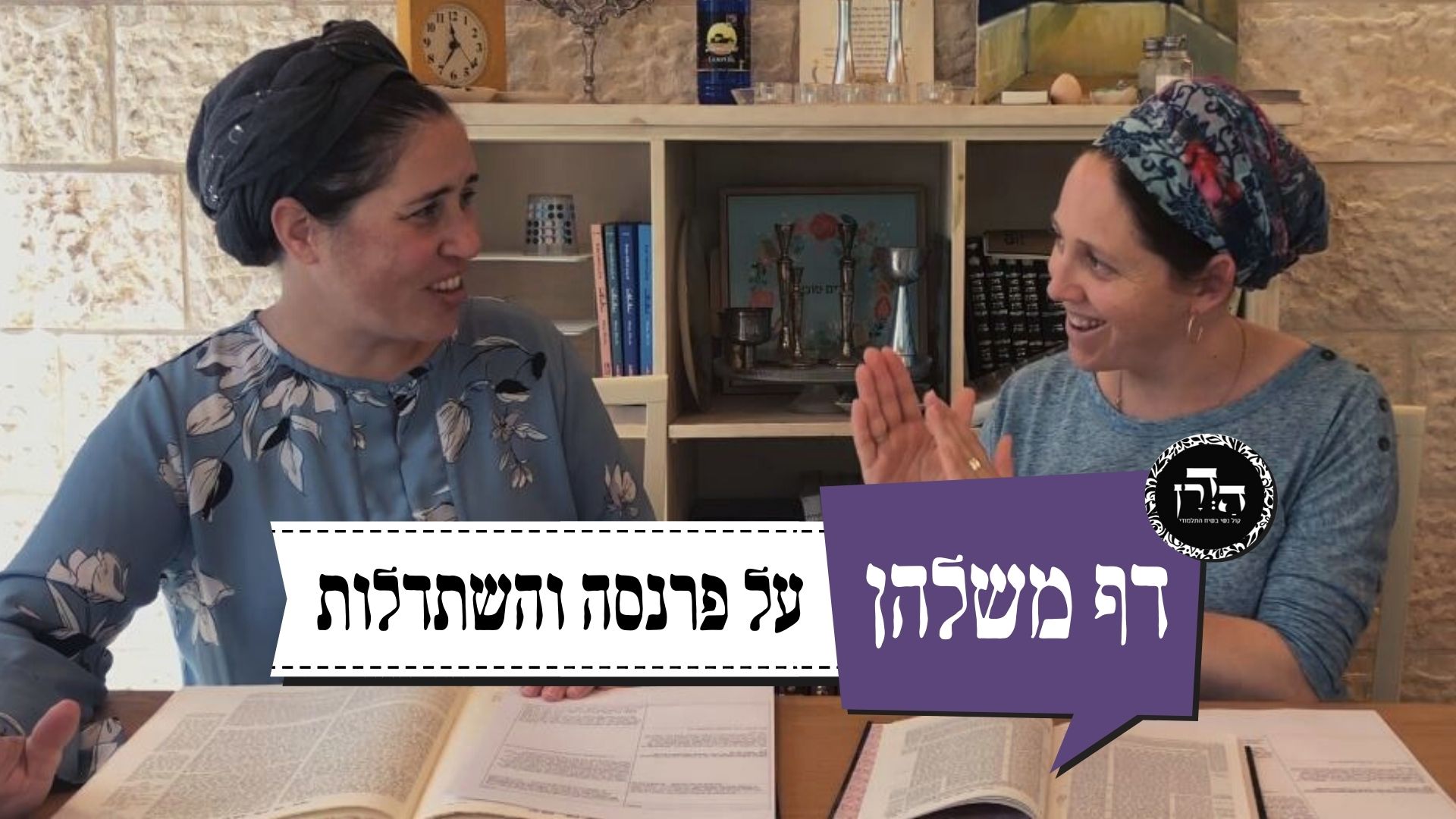ביצה ד
אוֹמֵר: רוֹאִין אֶת הָעֶלְיוֹנוֹת כָּאֵלּוּ הֵן פְּרוּדוֹת, וְהַתַּחְתּוֹנוֹת מַעֲלוֹת אֶת הָעֶלְיוֹנוֹת.
says: One considers the upper circles of dried figs as though they are separate pieces, rather than one unit. And the lower ones, which were there beforehand and have certainly been tithed, nullify the upper ones, as there are enough circles of figs in the entire barrel to nullify the upper litra.
רַבִּי יְהוֹשֻׁעַ אוֹמֵר: אִם יֵשׁ שָׁם מֵאָה פּוּמִּין — יַעֲלוּ, וְאִם לָאו — הַפּוּמִּין אֲסוּרִין, וְהַשּׁוּלַיִם מוּתָּרִין.
In contrast, Rabbi Yehoshua says: If there are one hundred mouths of different barrels or circular vessels there, the prohibited litra of untithed figs on the mouth of one of the vessels is nullified by a ratio of one part of prohibited figs to one hundred parts of similar, permitted figs. And if not, all of the circles of figs at the mouths of the barrels or circular vessels are prohibited, as one of them clearly contains a prohibited litra that has not been nullified. And the figs on the insides of the vessels are permitted, as the prohibited figs certainly did not reach there. This is Rabbi Meir’s version of the dispute.
רַבִּי יְהוּדָה אוֹמֵר, רַבִּי אֱלִיעֶזֶר אוֹמֵר: אִם יֵשׁ שָׁם מֵאָה פּוּמִּין — יַעֲלוּ, וְאִם לָאו — הַפּוּמִּין אֲסוּרִין, וְהַשּׁוּלַיִם מוּתָּרִין. רַבִּי יְהוֹשֻׁעַ אוֹמֵר: אֲפִילּוּ יֵשׁ שָׁם שְׁלֹשׁ מֵאוֹת פּוּמִּין — לֹא יַעֲלוּ.
Rabbi Yehuda says a different version of the dispute. Rabbi Eliezer says: If there are one hundred mouths of vessels with permitted figs present there, in addition to the prohibited one, it is nullified by the one hundred permitted mouths. And if not, the figs at the mouths are prohibited and those at the bottom are permitted. Rabbi Yehoshua says: Even if there are three hundred mouths present there, they are not nullified, as this litra cannot be nullified in any manner. Rav Pappa was referring to this opinion when he said that there is a tanna, meaning Rabbi Yehoshua in Rabbi Yehuda’s version, who maintains that even an item occasionally sold by unit, e.g., a circle of dried figs, can never be nullified.
דְּרָסָהּ בְּעִגּוּל וְאֵינוֹ יוֹדֵעַ בְּאֵיזֶה עִגּוּל דְּרָסָהּ — דִּבְרֵי הַכֹּל יַעֲלוּ. דִּבְרֵי הַכֹּל?! הַיְינוּ פְּלוּגְתַּיְיהוּ!
The same mishna further states: If one pressed the litra of figs into a circular vessel but he does not know into which circular vessel he pressed it, everyone agrees that the prohibited fig cakes are nullified. The Gemara expresses surprise at this statement: Everyone agrees? This is the very matter of their dispute, whether or not the litra is nullified.
אָמַר רַב פָּפָּא, הָכִי קָאָמַר: דְּרָסָהּ בְּעִגּוּל, וְאֵינוֹ יוֹדֵעַ בְּאֵיזֶה מְקוֹם עִגּוּל דְּרָסָהּ, אִי לִצְפוֹנָהּ אִי לִדְרוֹמָהּ — דִּבְרֵי הַכֹּל יַעֲלוּ.
Rav Pappa said: This is what the tanna said, i.e., he meant the following: One pressed it onto a circular vessel but does not know onto which place, which side of the circular vessel he pressed it, whether on its north or on its south side. In this case, as the prohibited litra is not located in a specific place and it cannot be distinguished from the others, it certainly cannot be considered an object of significance, and everyone agrees that it is nullified.
רַב אָשֵׁי אָמַר: לְעוֹלָם סָפֵק יוֹם טוֹב סָפֵק חוֹל הָוֵי דָּבָר שֶׁיֵּשׁ לוֹ מַתִּירִין, וְכׇל דָּבָר שֶׁיֵּשׁ לוֹ מַתִּירִין — אֲפִילּוּ בִּדְרַבָּנַן לֹא בָּטֵיל.
The Gemara explained why the egg mentioned in the baraita, an egg laid by a chicken that is a tereifa, cannot be nullified even if it is mingled with a thousand permitted eggs. However, Rav Ashi said: Actually, the baraita can be explained as referring to a case where there is uncertainty whether it is a Festival or a weekday. While it is true that according to most opinions this is a rabbinic prohibition, and the halakha is generally lenient with regard to uncertainties involving rabbinic law, it is an object whose prohibition is temporary. And with regard to any object whose prohibition is temporary, even if it involves a rabbinic prohibition, it cannot be nullified.
תַּנְיָא, אֲחֵרִים אוֹמְרִים מִשּׁוּם רַבִּי אֱלִיעֶזֶר: בֵּיצָה — תֵּאָכֵל הִיא וְאִמָּהּ. בְּמַאי עָסְקִינַן? אִילֵימָא בְּתַרְנְגוֹלֶת הָעוֹמֶדֶת לַאֲכִילָה — פְּשִׁיטָה דְּהִיא וְאִמָּהּ שַׁרְיָא! אֶלָּא בְּתַרְנְגוֹלֶת הָעוֹמֶדֶת לְגַדֵּל בֵּיצִים — הִיא וְאִמָּהּ אֲסוּרָה! אָמַר רַבִּי זֵירָא: תֵּאָכֵל אַגַּב אִמָּהּ.
§ It is taught in a baraita: Aḥerim say in the name of Rabbi Eliezer: With regard to an egg laid on a Festival, it and its mother may be eaten. The Gemara asks: With what case are we dealing? If we say that this is dealing with a chicken designated for food, it is obvious that it and its mother are permitted. Rather, say that this is dealing with a chicken designated for laying eggs, but in that case it and its mother are both prohibited. Rabbi Zeira said that the baraita should be understood as follows: The egg may be eaten on account of its mother; if the chicken is eaten on the Festival, the egg may also be eaten.
הֵיכִי דָּמֵי? אָמַר אַבָּיֵי: כְּגוֹן שֶׁלְּקָחָהּ סְתָם, נִשְׁחֲטָה — הוּבְרְרָה דְּלַאֲכִילָה עוֹמֶדֶת. לֹא נִשְׁחֲטָה — הוּבְרְרָה דִּלְגַדֵּל בֵּיצִים עוֹמֶדֶת.
The Gemara asks: What are the circumstances? In which case is it necessary to apply this ruling? Abaye said: It is referring to a case where one bought this chicken without specifying whether he intended to eat it or use it for its eggs. In that case, if the chicken was slaughtered on a Festival, it has been retroactively clarified that it was intended for food, and the eggs it lays are, therefore, permitted. If it was not slaughtered, it has been retroactively clarified that it was intended for laying eggs, and the eggs it lays are prohibited.
רַב מָרִי אָמַר: גּוּזְמָא קָתָנֵי. דְּתַנְיָא, אֲחֵרִים אוֹמְרִים מִשּׁוּם רַבִּי אֱלִיעֶזֶר: בֵּיצָה תֵּאָכֵל הִיא וְאִמָּהּ, וְאֶפְרוֹחַ וּקְלִיפָּתוֹ.
Rav Mari said that the phrase: It and its mother may be eaten, should not be taken literally. Rather, the tanna is teaching an exaggeration [guzma], for extra emphasis, as it is taught in another baraita: Aḥerim say in the name of Rabbi Eliezer: An egg may be eaten, it and its mother, and a chick and its shell.
מַאי קְלִיפָּתוֹ? אִילֵּימָא קְלִיפָּה מַמָּשׁ, קְלִיפָּה בַּת אֲכִילָה הִיא? אֶלָּא אֶפְרוֹחַ בִּקְלִיפָּתוֹ. עַד כָּאן לָא פְּלִיגִי רַבָּנַן עֲלֵיהּ דְּרַבִּי אֱלִיעֶזֶר בֶּן יַעֲקֹב, אֶלָּא הֵיכָא דְּיָצָא לַאֲוִיר הָעוֹלָם. אֲבָל הֵיכָא דְּלֹא יָצָא לַאֲוִיר הָעוֹלָם — לָא פְּלִיגִי.
The Gemara clarifies: What is the meaning of this addition: Its shell? If we say it is referring to an actual shell, is a shell edible? Rather, the baraita must be referring to the consumption of a chick that is still in its shell. This explanation is problematic, as the Rabbis disagree with Rabbi Eliezer ben Ya’akov only in permitting the eating of a chick immediately after it hatches, when it has already entered the world. However, when it has not yet entered the world, i.e., if the chick is still in its shell, they do not disagree. Even the Rabbis accept that this chick has the status of a creeping animal and may not be eaten.
אֶלָּא ״אֶפְרוֹחַ וּקְלִיפָּתוֹ״ — גּוּזְמָא, הָכָא נָמֵי ״תֵּאָכֵל הִיא וְאִמָּהּ״ — גּוּזְמָא.
Rather, evidently the expression: A chick and its shell, should not be understood literally, as it is an exaggeration. Here, too, the phrase: It and its mother may be eaten, is an exaggeration. It does not mean literally that the chick and its mother may be eaten, but is merely a statement of emphasis that the egg is undoubtedly permitted.
אִתְּמַר, שַׁבָּת וְיוֹם טוֹב, רַב אָמַר: נוֹלְדָה בָּזֶה — אֲסוּרָה בָּזֶה, וְרַבִּי יוֹחָנָן אָמַר: נוֹלְדָה בָּזֶה — מוּתֶּרֶת בָּזֶה. נֵימָא קָסָבַר רַב: קְדוּשָּׁה אַחַת הִיא?
§ It was stated that amora’im disputed the following issue (Eiruvin 38b): If Shabbat and a Festival occur on consecutive days, Rav said: An egg laid on this one is prohibited on that one, and Rabbi Yoḥanan said: An egg laid on this one is permitted on that one. The Gemara asks: Let us say that Rav holds that when Shabbat and a Festival occur on consecutive days, it is considered one continuous sanctity, i.e., a single, indivisible day.
וְהָאָמַר רַב: הֲלָכָה כְּאַרְבָּעָה זְקֵנִים וְאַלִּיבָּא דְּרַבִּי אֱלִיעֶזֶר, דְּאָמַר: שְׁתֵּי קְדוּשּׁוֹת הֵן.
But didn’t Rav say: The halakha is in accordance with the opinion of four elders, who ruled in accordance with the opinion of Rabbi Eliezer, who said: When a Shabbat and a Festival occur consecutively, they are two sanctities rather than one long day; therefore, a joining of Shabbat boundaries need not be placed on a weekday, but may be placed on the first of the holy days to allow going beyond the Shabbat boundary on the second. Evidently, this issue cannot be the basis of their dispute.
אֶלָּא, הָכָא בַּהֲכָנָה דְרַבָּהּ קָמִיפַּלְגִי: רַב אִית לֵיהּ הֲכָנָה דְרַבָּה, וְרַבִּי יוֹחָנָן לֵית לֵיהּ הֲכָנָה דְרַבָּה.
Rather, here they disagree with regard to Rabba’s preparation, i.e., an item that was prepared on its own from one day to the other, whose use Rabba prohibits. Rav holds that items prepared by means of Rabba’s preparation are prohibited, whereas Rabbi Yoḥanan does not hold that items prepared by means of Rabba’s preparation are prohibited.
כְּתַנָּאֵי: נוֹלְדָה בְּשַׁבָּת — תֵּאָכֵל בְּיוֹם טוֹב, בְּיוֹם טוֹב — תֵּאָכֵל בְּשַׁבָּת. רַבִּי יְהוּדָה אוֹמֵר מִשּׁוּם רַבִּי אֱלִיעֶזֶר: עֲדַיִין הִיא מַחֲלוֹקֶת, שֶׁבֵּית שַׁמַּאי אוֹמְרִים: תֵּאָכֵל, וּבֵית הִלֵּל אוֹמְרִים: לֹא תֵּאָכֵל.
The Gemara comments: This dispute is like a dispute between tanna’im: An egg laid on Shabbat may be eaten on a Festival; if it was laid on a Festival, it may be eaten on Shabbat. Rabbi Yehuda says in the name of Rabbi Eliezer: This opinion is not unanimous; rather, it is still a matter of dispute, as Beit Shammai say it may be eaten, and Beit Hillel say it may not be eaten, just as they disagreed about whether an egg is permitted on the day on which it was laid.
אוּשְׁפִּיזְכָּנֵיהּ דְּרַב אַדָּא בַּר אַהֲבָה הֲווֹ לֵיהּ הָנָךְ בֵּיצִים מִיּוֹם טוֹב לְשַׁבָּת. אֲתָא לְקַמֵּיהּ, אֲמַר לֵיהּ: מַאי לְאַטְווֹיִנְהוּ הָאִידָּנָא וְנֵיכְלִינְהוּ לִמְחַר?
The Gemara relates: Rav Adda bar Ahava’s host [ushpizikhnei] had these eggs that were laid on a Festival that occurred on a Friday, and the host was unsure whether eggs laid on the Festival were permitted from the Festival for use on Shabbat. He came before his guest, Rav Adda, and said to him: What is the halakha with regard to roasting these eggs now, on the Festival, although eating them today is prohibited due to nolad, and let us eat them tomorrow, as they will be no longer be prohibited due to nolad?
אֲמַר לֵיהּ: מַאי דַּעְתָּיךְ, רַב וְרַבִּי יוֹחָנָן — הֲלָכָה כְּרַבִּי יוֹחָנָן. אֲפִילּוּ רַבִּי יוֹחָנָן לָא קָא שָׁרֵי אֶלָּא לְגוֹמְעָהּ לְמָחָר, אֲבָל בְּיוֹמֵיהּ לָא.
Rav Adda said to him: What is your opinion that led you to pose this question? You evidently assume that in the dispute between Rav and Rabbi Yoḥanan, the halakha is in accordance with the opinion of Rabbi Yoḥanan, and therefore an egg laid on one day will be permitted on the following day. However, even Rabbi Yoḥanan permitted one to swallow it only raw, on the next day, when it is no longer prohibited; but on the same day that it was laid, he did not permit one even to move it, and certainly not to roast it.
וְהָתַנְיָא: אַחַת בֵּיצָה שֶׁנּוֹלְדָה בְּשַׁבָּת וְאַחַת בֵּיצָה שֶׁנּוֹלְדָה בְּיוֹם טוֹב — אֵין מְטַלְטְלִין אוֹתָהּ, לֹא לְכַסּוֹת בָּהּ אֶת הַכְּלִי, וְלֹא לִסְמוֹךְ בָּהּ כַּרְעֵי הַמִּטָּה.
And it is taught likewise in a baraita: With regard to both an egg that was laid on Shabbat and an egg that was laid on a Festival, one may not move it, neither to cover a vessel with it nor to support the legs of a bed with it.
אוּשְׁפִּיזְכָּנֵיהּ דְּרַב פָּפָּא, וְאָמְרִי לַהּ, הָהוּא גַּבְרָא דַּאֲתָא לְקַמֵּיהּ דְּרַב פָּפָּא. הֲווֹ לֵיהּ הָנָךְ בֵּיצִים מִשַּׁבָּת לְיוֹם טוֹב. אֲתָא לְקַמֵּיהּ, אֲמַר לֵיהּ: מַהוּ לְמֵכְלִינְהוּ לִמְחַר? אֲמַר לֵיהּ: זִיל הָאִידָּנָא וּתָא לִמְחַר, דְּרַב לָא מוֹקֵי אָמוֹרָא עִלָּוֵיהּ מִיּוֹמָא טָבָא לְחַבְרֵיהּ מִשּׁוּם שִׁכְרוּת.
The Gemara relates a similar incident: Rav Pappa’s host, and some say it was a certain man who came before Rav Pappa, had these eggs that were laid on a Shabbat that occurred before a Festival. He came before him and said to him: What is the halakha with regard to whether it is permitted to eat these eggs tomorrow, on the Festival? Rav Pappa said to him: Go away from me now, and come back tomorrow. He said this because Rav would not place a disseminator before him to explain his lectures, from one Festival day until the end of the other, the second Festival day, due to drunkenness. Since it was customary in those times to drink a great deal of wine during Festival meals, Rav was concerned that his mind would not be sufficiently clear to issue a public ruling.
כִּי אֲתָא לִמְחַר, אֲמַר לֵיהּ:
When that man came back on the following day, Rav Pappa said to him:
אֵיכוּ הַשְׁתָּא, אִשְׁתְּלַאי וַאֲמַרִי לְךָ: רַב וְרַבִּי יוֹחָנָן — הֲלָכָה כְּרַבִּי יוֹחָנָן. הָא אָמַר רָבָא: הִלְכְתָא כְּוָתֵיהּ דְּרַב בְּהָנֵי תְּלָת, בֵּין לְקוּלָּא בֵּין לְחוּמְרָא.
Had I issued a ruling for you then, I would have forgotten the correct response, and I would have said to you, based on the accepted principle that in the case of a dispute between Rav and Rabbi Yoḥanan, the halakha is in accordance with the opinion of Rabbi Yoḥanan, that the eggs are permitted. However, Rava said: The halakha is in accordance with the opinion of Rav with regard to these three issues, in connection to the sanctity of Festivals and Shabbat, whether his ruling is lenient, or whether it is stringent. This is one of those three cases in which the halakha is in accordance with the opinion of Rav.
אָמַר רַבִּי יוֹחָנָן: עֵצִים שֶׁנָּשְׁרוּ מִן הַדֶּקֶל בְּשַׁבָּת — אָסוּר לְהַסִּיקָן בְּיוֹם טוֹב. וְאַל תְּשִׁיבֵנִי בֵּיצָה, מַאי טַעְמָא? בֵּיצָה מִשּׁוּם דִּבְיוֹמָא נָמֵי חַזְיָא לְגוֹמְעָהּ וְלָא קָא שָׁרֵי לַהּ עַד לִמְחַר — מִידָּע יְדִיעַ דְּבַת יוֹמָא אַסְרוּהָ. עֵצִים דְּלָא חָזוּ לְיוֹמַיְיהוּ, אִי שָׁרֵי לְהוּ לִמְחַר — אָתֵי לְמֵימַר: בְּיוֹמַיְיהוּ נָמֵי שְׁרוּ, וְאֶתְמוֹל מִשּׁוּם שַׁבָּת הוּא דְּלָא חָזוּ לְהַסָּקָה.
§ Rabbi Yoḥanan said: With regard to branches that fell from a palm tree on Shabbat, it is prohibited to kindle them on a Festival that occurs the next day. And do not reply to me by asking why I permit an egg to be eaten on the following day. What is the reason for the distinction between the two cases? In the case of an egg, because on the day of Shabbat itself it is also fit to be swallowed raw and nevertheless it is permitted to be eaten only the following day, one knows that an egg is prohibited on the day it was laid. In contrast, with regard to branches, which are not fit for kindling on the day of Shabbat, as kindling a fire is prohibited, if you permit them to kindle the wood on the Festival that occurs on the following day they will mistakenly come to say that on the day that they fell off the tree they are also permitted. And as for the reason the branches were not kindled yesterday when they fell from the tree, it was due only to Shabbat, as they were not fit for kindling then.
אָמַר רַב מַתְנָה: עֵצִים שֶׁנָּשְׁרוּ מִן הַדֶּקֶל לְתוֹךְ הַתַּנּוּר בְּיוֹם טוֹב — מַרְבֶּה עֲלֵיהֶם עֵצִים מוּכָנִים, וּמַסִּיקָן: וְהָא קָא מְהַפֵּךְ בְּאִיסּוּרָא! כֵּיוָן דְּרוּבָּא דְּהֶיתֵּרָא נִינְהוּ, כִּי קָא מְהַפֵּךְ — בְּהֶיתֵּרָא קָא מְהַפֵּךְ.
Rav Mattana said: With regard to branches that fell from a palm tree directly into an oven on a Festival, one may add to those branches wood prepared from the previous day, which may be used for kindling, and kindle them all together. The Gemara asks: But doesn’t he turn over and move the prohibited wood in the course of the cooking process? The Gemara answers: Since most of the wood is permitted, when he turns it over, he turns over permitted wood, as the prohibited part is nullified by the majority.
וְהָא קָא מְבַטֵּל אִיסּוּרָא לְכַתְּחִלָּה, וּתְנַן: אֵין מְבַטְּלִין אָסוּר לְכַתְּחִלָּה! הָנֵי מִילֵּי בִּדְאוֹרָיְיתָא, אֲבָל בִּדְרַבָּנַן מְבַטְּלִין.
The Gemara challenges this: But doesn’t he thereby nullify a prohibited item ab initio, by adding permitted wood to the pieces of wood that fell into the oven, which are prohibited? And we learned in a mishna (see Terumot 5:9): One may not nullify a prohibited item ab initio. The Gemara answers: That principle applies only to items prohibited by Torah law; but with regard to items prohibited by rabbinic law, as in this case involving the prohibition of muktze, one may nullify the prohibition ab initio.
וּלְרַב אָשֵׁי דְּאָמַר: כׇּל דָּבָר שֶׁיֵּשׁ לוֹ מַתִּירִין אֲפִילּוּ בִּדְרַבָּנַן לֹא בָּטֵיל, מַאי אִיכָּא לְמֵימַר? הָנֵי מִילֵּי הֵיכָא דְּאִיתֵיהּ לְאִיסּוּרָא בְּעֵינֵיהּ, הָכָא — מִקְלָא קָלִי אִיסּוּרָא.
The Gemara asks: And according to the opinion of Rav Ashi, who said: Any object whose prohibition is temporary, even if the prohibition applies by rabbinic law, it cannot be nullified, what is there to say? Doesn’t Rav Ashi agree that it is permitted to kindle the wood after the Festival? The Gemara answers: That principle applies only where the prohibited item remains intact; here, however, the prohibited item is burned, as the wood is turned over when it has already become charcoal. Therefore, one does not perform any action with prohibited items.
אִתְּמַר: שְׁנֵי יָמִים טוֹבִים שֶׁל גָּלִיּוֹת, רַב אָמַר: נוֹלְדָה בָּזֶה — מוּתֶּרֶת בָּזֶה, וְרַב אַסִּי אָמַר: נוֹלְדָה בָּזֶה — אֲסוּרָה בָּזֶה.
§ It was stated that there is a dispute between amora’im with regard to the halakha for the two Festival days observed in the Diaspora. Rav said: An egg that was laid on this day is permitted on that one, and Rav Asi said: An egg that was laid on this day is prohibited on that one.
לֵימָא קָא סָבַר רַב אַסִּי קְדוּשָּׁה אַחַת הִיא? וְהָא רַב אַסִּי מַבְדֵּיל מִיּוֹמָא טָבָא לְחַבְרֵיהּ!
The Gemara asks: Let us say that Rav Asi holds that the two days are one sanctity. But didn’t Rav Asi himself recite havdala, the prayer of distinction at the end of a holy day, from one Festival day of the Diaspora to the other? This shows that, in his opinion, the first day is the true Festival, while the second day is considered a weekday. In earlier generations, they observed the second day of the Diaspora because they were unaware when the court sanctified the New Moon to mark the beginning of the month. Today, that determination is accomplished by means of calculations known to all, and the second day is observed as the custom of our fathers, not due to any uncertainty.
רַב אַסִּי סַפּוֹקֵי מְסַפְּקָא לֵיהּ, וְעָבֵיד הָכָא לְחוּמְרָא וְהָכָא לְחוּמְרָא.
The Gemara answers: Rav Asi was uncertain whether the Sages’ ordinance that the second day is to be observed as a Festival was a fixed ordinance that applies even when the calculations determining the New Moon are known to all; or whether the ordinance was based strictly on the uncertainty stemming from their lack of awareness. Today, when everyone is aware of the beginning of the month, the second day is a weekday. And therefore he acted stringently here, and prohibited eating an egg on the second day that had been laid on the first day. And he also acted stringently here, and recited havdala between the two days.
אָמַר רַבִּי זֵירָא: כְּוָתֵיהּ דְּרַב אַסִּי מִסְתַּבְּרָא, דְּהָאִידָּנָא יָדְעִינַן בִּקְבִיעָא דְיַרְחָא, וְקָא עָבְדִינַן תְּרֵי יוֹמֵי.
Rabbi Zeira said: It is reasonable to say in accordance with the opinion of Rav Asi that the Sages considered the two days as one and it is not a practice instituted due to uncertainty, as today we know the determination of the first day of the new month based on a fixed calendar and the precise dates of the Festivals are known by all, and nevertheless we observe the two Festival days of the Diaspora.
אָמַר אַבָּיֵי: כְּוָתֵיהּ דְּרַב מִסְתַּבְּרָא, דִּתְנַן: בָּרִאשׁוֹנָה, הָיוּ מַשִּׂיאִין מַשּׂוּאוֹת. מִשֶּׁקִּלְקְלוּ הַכּוּתִים, הִתְקִינוּ שֶׁיְּהוּ שְׁלוּחִין יוֹצְאִין.
Abaye said: On the contrary, It is reasonable to say in accordance with the opinion of Rav that the second day is observed as a Festival due to uncertainty, as we learned in a mishna (Rosh HaShana 22b): Initially, after the court sanctified the new month, they would light torches on the mountain tops, from one peak to another, to signal that the New Moon had been sanctified. After the Samaritans [Kutim] disrupted this method by lighting torches at the wrong times, the Sages instituted that messengers should depart to inform the people of the start of the month. Since the messengers could not reach all Diaspora communities before the beginning of the Festival, the Sages instituted that an additional Festival day should be observed there, due to the resultant uncertainty with regard to which day was the actual Festival day.
וְאִילּוּ בָּטְלוּ כּוּתִים — עָבְדִינַן חַד יוֹמָא, וְהֵיכָא דְּמָטוּ שְׁלוּחִין — עָבְדִינַן חַד יוֹמָא.
Abaye continues his argument: And this indicates that if the Samaritans had desisted from their interference, the Sages would have restored the earlier custom and we would observe only one day. And, similarly, in a place where the messengers arrived from Jerusalem on time, we observe only one Festival day.
וְהַשְׁתָּא דְּיָדְעִינַן בִּקְבִיעָא דְיַרְחָא, מַאי טַעְמָא עָבְדִינַן תְּרֵי יוֹמֵי? מִשּׁוּם דִּשְׁלַחוּ מִתָּם: הִזָּהֲרוּ בְּמִנְהַג אֲבוֹתֵיכֶם בִּידֵיכֶם, זִמְנִין דְּגָזְרוּ הַמַּלְכוּת גְּזֵרָה וְאָתֵי לְאִקַּלְקוּלֵי.
The Gemara asks: And now that we know the determination of the first day of the new month, what is the reason that we observe two Festival days in the Diaspora? Because they sent a warning from there, from Eretz Yisrael: Although now there is a fixed calendar and there is no uncertainty, be careful to observe the custom of your fathers that you received, because at times the monarchy will issue decrees of persecution restricting Torah study and the fixed calendar may be forgotten. And the people will come to have their proper observance of the Festivals be disrupted again. However, the fundamental halakha is that the observance of two Festival days is based on uncertainty.
אִתְּמַר, שְׁנֵי יָמִים טוֹבִים שֶׁל רֹאשׁ הַשָּׁנָה. רַב וּשְׁמוּאֵל דְּאָמְרִי תַּרְוַיְיהוּ: נוֹלְדָה בָּזֶה — אֲסוּרָה בָּזֶה, דִּתְנַן: בָּרִאשׁוֹנָה הָיוּ מְקַבְּלִין עֵדוּת הַחֹדֶשׁ כׇּל הַיּוֹם (כּוּלּוֹ). פַּעַם אַחַת נִשְׁתַּהוּ הָעֵדִים לָבֹא,
§ It was further stated that the amora’im discussed a similar problem, with regard to the two Festival days of Rosh HaShana. Rav and Shmuel both said: An egg laid on this day is prohibited on that one, as the two days of Rosh HaShana have a special status. As we learned in a mishna (Rosh HaShana 30b): Initially, the court would accept testimony of witnesses who saw the new moon to establish the first day of the new month. This system would also be used for the first of Tishrei, which is Rosh HaShana, and the court would accept this testimony on the entire thirtieth day of the month of Elul. Once, the witnesses tarried and managed to arrive only when the hour was late,

